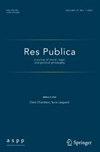结果主义与实践在政治哲学中的作用
IF 1.1
2区 哲学
0 PHILOSOPHY
Res Publica-A Journal of Moral Legal and Political Philosophy
Pub Date : 2023-10-11
DOI:10.1007/s11158-023-09631-1
引用次数: 1
摘要
政治哲学家最近一直在争论社会实践在规范理论化中应该扮演什么角色。我们的理论应该独立于实践还是依赖于实践?也就是说,我们是否可以独立于现实世界的实践而制定规范性的制度原则,或者这些原则是否只与它们所要治理的实践相关?政治哲学中的任何一阶理论都必须应对这场辩论所带来的方法论挑战。在这篇文章中,我认为结果主义对社会实践应该如何影响规范性政治哲学有一个合理的解释。我概述了结果主义的一个版本,实践结果主义,它为将社会实践整合到规范理论中提供了一个合理的蓝图。其次,我认为实践结果主义很好地解释了实践依赖辩论双方的核心论点。结果主义抓住了实践依赖的论点,揭示了为什么现实世界的实践是制定制度原则的核心。相反,结果主义抓住了实践独立性的论点,为评估实践提供了一个清晰的外部规范视角。本文章由计算机程序翻译,如有差异,请以英文原文为准。
Consequentialism and the Role of Practices in Political Philosophy
Abstract Political philosophers have recently debated what role social practices should play in normative theorising. Should our theories be practice-independent or practice-dependent? That is, can we formulate normative institutional principles independently of real-world practices or are such principles only ever relative to the practices they are meant to govern? Any first-order theory in political philosophy must contend with the methodological challenges coming out of this debate. In this article, I argue that consequentialism has a plausible account of how social practices should factor in normative political philosophy. I outline a version of consequentialism, Practice Consequentialism, that provides a plausible blueprint for integrating social practices in normative theorising. Second, I argue that Practice Consequentialism accounts well for the central arguments on both sides of the practice-dependence debate. Capturing arguments for practice-dependence, consequentialism brings out why real-world practices are central in formulating institutional principles. Conversely, capturing arguments for practice-independence, consequentialism offers a clear external normative perspective from which to evaluate practices.
求助全文
通过发布文献求助,成功后即可免费获取论文全文。
去求助
来源期刊
CiteScore
1.40
自引率
0.00%
发文量
32
期刊介绍:
Res Publica: a Journal of Legal, Moral and Social Philosophy is an interdisciplinary publication concerned with the philosophical analysis of moral, political, social and legal issues. It provides a forum for discussion of theoretical issues; a public arena for voicing matters of practical concern; and a vehicle for addressing questions of morality, politics, law and society, the interconnections between them and, more generally, the relation of theory to practice. The journal seeks to publish articles and review essays which are both philosophically rigorous and accessible to a wide range of academics and professionals. Replies to articles are welcome. It is the policy of Res Publica to encourage publication by researchers at the beginning of their careers as well as by established scholars; and by those in non-Western countries.

 求助内容:
求助内容: 应助结果提醒方式:
应助结果提醒方式:


